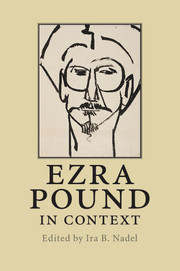Book contents
- Frontmatter
- Contents
- Notes on contributors
- Acknowledgements
- Chronology
- List of abbreviations and note on references to The Cantos
- Introduction
- Part I Biography and works
- Part II Historical and cultural context
- Part III Critical reception
- 39 Pound before Paris: 1908–1920
- 40 Pound before Pisa: 1920–1945
- 41 Pound after Pisa: 1945–1972
- 42 Influence
- Further reading
- Index
40 - Pound before Pisa: 1920–1945
Published online by Cambridge University Press: 05 July 2014
- Frontmatter
- Contents
- Notes on contributors
- Acknowledgements
- Chronology
- List of abbreviations and note on references to The Cantos
- Introduction
- Part I Biography and works
- Part II Historical and cultural context
- Part III Critical reception
- 39 Pound before Paris: 1908–1920
- 40 Pound before Pisa: 1920–1945
- 41 Pound after Pisa: 1945–1972
- 42 Influence
- Further reading
- Index
Summary
Ezra Pound's career comes in three acts. This chapter deals with Act Two, the period between his forsaking of London in 1920 and before he is returned to the United States from the Italian city of Pisa as a traitor in 1946. There is no doubt that tragedy dominates Act Three in Pisa and beyond, but Act One, the London years, can be cast in epic terms, as a heroic struggle to rid Mount Helicon of both the beefy bluster left over from the Victorians and the genteel prissiness of Edwardian and Georgian literary culture. The undercurrent of aestheticism that runs from the Pre-Raphaelites in the 1850s, through Walter Pater, to the nineties, the Rhymers Club, and, finally, to the martyrdom of Oscar Wilde on the altar of Victorian moralism, is still, in Pound's London years, in very bad odor. “Yeux Glaques,” the sixth lyric in Hugh Selwyn Mauberley (Life and Contacts)(1920) captures precisely the soft, sexualized underside of aestheticism and the bullying Victorian response:
Foetid Buchanan lifted up his voice
When that faun's head of hers
Became a pastime for
Painters and adulterers.
(P, 1990, 189)It was easy to dismiss the Buchanans and to proclaim a new kind of heady, virile aestheticism that apologized for nothing and gave back as good as it got.
Act Two, the middle years, are neither tragic nor heroic. They are not so easy to characterize. Perhaps they have elements of the tragic and comic about them. Or perhaps they constitute a kind of Purgatorio, but they do not, as in Dante, lead to Paradiso. In a reversal of Dante’s plot, the London years may have been more of a paradise than what follows after 1920. And certainly at Pisa in 1945 Pound entered a real Inferno. In the London years, Pound seemed to be in heaven, to borrow the words of William Wordsworth in another context, “Bliss was it in that dawn to be alive” (The Prelude, 11.108).
- Type
- Chapter
- Information
- Ezra Pound in Context , pp. 447 - 456Publisher: Cambridge University PressPrint publication year: 2010



